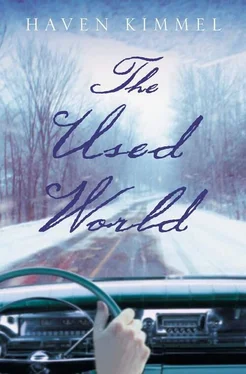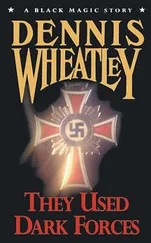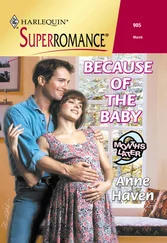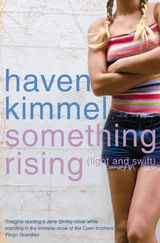1 ...7 8 9 11 12 13 ...19 She would say, Peter, there was a sinking-down comfort in my life, as if I knew I was trapped in the belly of a whale, and so I built my little fires and was content to ride the waves out. All my life I’d looked around at the hangar of ribs, the slick walls, and thought, This is the size of the world. But what if the Leviathan opened his mouth? What if the greatest darkest biggest beast in the deepest sea imaginable, my God, the land that was my God and the Mission and the fear that were the swallowing that had swallowed me; what if that very beast opened wide and there above the sky I had always thought was the sky, the hard black whale palate dotted with whale stars; what if that sky opened to the sky above the sea, and I could see the wild spread of it above me, the real stars for once, for the first time? What if I suddenly saw the teeth, the tongue, the cervical curve of the whale’s mouth? What then?
Well, she thought, taking a deep breath, I would run for it.
She gave him thirty seconds more, but she knew he wasn’t coming. Peter didn’t pull her from the sea. He wasn’t the shore, the sky, the stars. He was just standing there, agreeable at the time, and while she hadn’t even begun to grieve for him, hadn’t begun to reckon up what the cost would be to her in the end, she also knew women never really die from love. Hazel had told her so.
Rebekah put the car in gear, and headed home.
Claudia stopped at Parker’s Supermarket on her way out of town, joining half of Jonah in the joy of the looming crisis. She took what milk was left, the orphaned loaves of wheat bread. Not knowing whether the storm would even come, and if it did what she would need, made her forget what she’d come for. The store was vast, too bright, and both her knees and her will felt porous. Again and again and again, the car door, the parking lot, the groceries, the stares. In the produce section she stood a few moments unmoving, thinking how odd the fact of consciousness in beings who spent their lives like hamsters on a wheel.
She ended up buying more fruit than she could ever eat, and a few things she’d never purchased before in her life: buttermilk bath salts, smoked cheese, a bar of bittersweet chocolate. On a whim, she went back and bought two of everything, thinking she might leave a bag on her sister’s porch with no note, as if Millie had been the object of a visitation; Millie, who had no need of help from anyone, and didn’t care much for food. Everyone in the store gave Claudia at least a long look; and one elderly woman stopped in her tracks and pointed directly at Claudia’s chest, while saying to her stooped husband, “Look-a there!” Claudia walked on, never meeting an eye or giving an indication she’d heard their comments, as if she weren’t merely too tall, too broad, but deaf and blind as well. It wasn’t that she was resigned to her status, although that was part of it. And she hadn’t precisely taken inside herself the years of scorn, although for a while she had. Now she relied on something she’d heard Amos Townsend say in church a few months earlier.
He had welcomed them and they’d sung something, Claudia couldn’t remember the song, and then he read from Scripture and she didn’t remember what that was either—something from the book of Mark, she suspected—and then Amos began to talk about the character of Jesus. He’d quoted a Quaker theologian named D. Elton Trueblood: “Jesus Christ can be accepted; He can be rejected; He cannot reasonably be ignored.” Claudia wrote the words in the little notebook she had taken to bringing with her to church. She could see how Trueblood’s claim might be true intellectually, and yet ignoring Jesus was as easy as ignoring anyone else in the realm of the dead, as far as she was concerned. He could have easily said that the Civil War cannot reasonably be ignored, or the mechanics of evolution, or the missile silos in the American West. Of course they can’t, she had thought, and yet it’s in our nature to ignore everything except our survival, and indeed, our survival probably depended upon a narrowness of focus that began in the morning with the hunt and ended at night with shelter. She was thinking of this when Amos said that he’d thought about Jesus his whole life—he agreed with Trueblood—and as an adult his contemplation felt like a combination of what young girls feel for rock stars and what young boys feel for abusive fathers. Claudia had blinked, taken a breath. He imagined, Amos said, a girl lying on a sofa, studying pictures and biographies of the object of her affection, imagining she knew Him in a way no one else did, and also hoping to get closer, to establish greater intimacy and to get to the bottom, finally, of her passion. Or a boy, walking through the house after dinner and hearing his father come up the steps—the wariness, the quick prayer, Please don’t let him notice me. Jesus, Amos continued, had always struck him as a man filled with rage. Think of Jesus’ impatience with His mother, with the Apostles, His chilly distance from the people on whom He performed miracles, how He was so irritated with everyone who simply didn’t get it. Think of Him with the fig tree. What a world to be born into! How grotesque and cruel to be made manifest by the Divine just to suffer and be killed for a senseless metaphorical principle. Amos shook his head in disbelief, mentioned Abraham and Isaac, Kierkegaard, how the message sent was understood by the Son, but not by the messenger. He paraphrased a passage from a book about cosmic child abuse. Claudia was lost a moment, then Amos said he thought the great message of Jesus might be there, in His anger, in the abuse He had suffered not at the hands of the Romans, but at the hands of His Father, because that’s what we really share with Him. We are called upon to love a God who either didn’t see fit to protect us from disaster and death, or was helpless to prevent it. What sort of a God was that? And Jesus, in response, created for Himself a sort of daily compassion (not empathy, of which He seemed to have little, at least to Amos), but a cobbled-together will-to-patience that was born not of His divinity, but of His humility. Amos said he’d imagined Jesus so many times repeating under His breath, “Don’t smite them, don’t smite them, they’re really just a bunch of morons and are in enough trouble already,” repeating it as He healed the hemorrhaging woman, the blind man, the soldier, people He did not love but took mercy upon anyway. If Jesus hadn’t seen His lot as the same as humanity’s, He could not have been human. And if He hadn’t felt compassion for the people around Him, He could not have been Divine. “Or maybe I’m just mad at my Father,” Amos had said near the end of the sermon, with his rueful smile. He ended by saying it was possible to consider Jesus an entire lifetime and find nothing but projections of our own futility, our own fear of death; He was a wild, blank, imaginal screen on which we had cast our looming cultural shadow.
The Haddington Church of the Brethren was completely silent when Amos stopped speaking. Claudia didn’t dare look around, but she wondered what the other parishioners were thinking as they listened. At the time she didn’t even know what Brethren meant, except that she never thought about her clothes when she was there, and no one and nothing but Amos Townsend and this church really interested her.
After that Sunday, Claudia thought often of the phrase ‘He created for Himself a kind of daily compassion,’ and she tried to do the same, even though she lacked power, divinity, wisdom, grace. She walked through the grocery store, or stepped into a gas station, and when the toothless women in sweatshirts, their bodies and hair reeking of cigarette smoke and fast food, stared at her cruelly or even went so far as to make a comment, she no longer thought, They hate me. Now she tried to remind herself that if we don’t feel the weight of the human condition, we must not be fully human. She thought instead, They hate themselves. They hate being alive. They hate their Fathers.
Читать дальше












